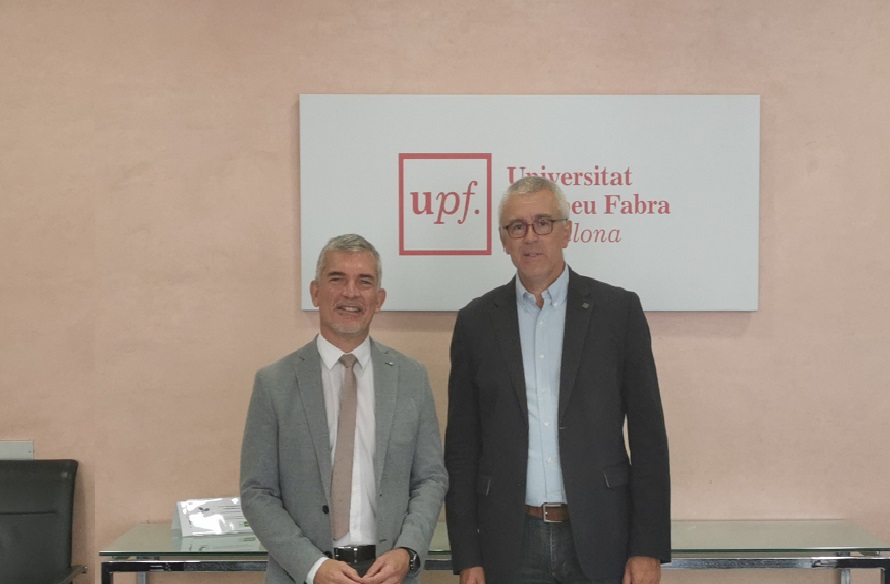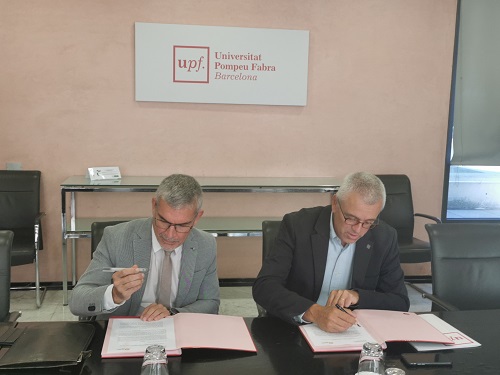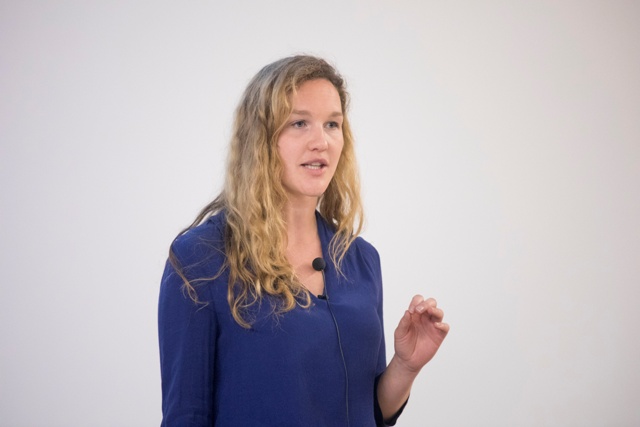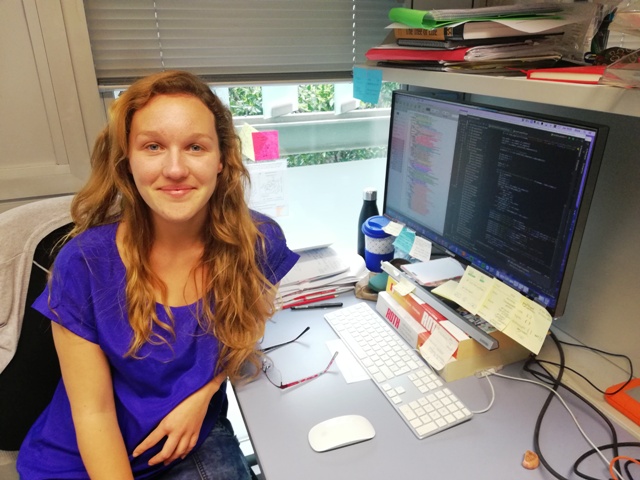La UPF i l’Institut Català del Sòl col·laboraran per potenciar el benestar planetari i la sostenibilitat territorial
La UPF i l’Institut Català del Sòl col·laboraran per potenciar el benestar planetari i la sostenibilitat territorial
Les dues institucions han signat un acord marc de col·laboració per fomentar la docència, la recerca i la difusió del coneixements en aquests àmbits. En virtut d’aquest acord, es crearà la Càtedra Incasòl-UPF i s’establiran sinergies entre els projectes estratègics Planetary Wellbeing (UPF) i Agenda Urbana de Catalunya (Incasòl).

La UPF i l’Institut Català del Sòl (Incasòl) han signat un acord marc de col·laboració per tal de dinamitzar i fomentar la docència, la recerca i la difusió de coneixements en l’àmbit del benestar i la qualitat de vida de les persones, de la sostenibilitat del territori i del mateix planeta, com a ecosistema global.
L’acord marc, en virtut del qual es crearà la Càtedra Incasòl-UPF i s’establiran sinergies entre els projectes Planetary Wellbeing (UPF) i Agenda Urbana de Catalunya (Incasòl), té com a principal objectiu identificar solucions integrades, innovadores i interdisciplinàries en tots aquests àmbits.
Jaume Casals, rector de la UPF, i Albert Civit, director de l’Incasòl, han signat l’acord, que té una durada de quatre anys (prorrogables), en el decurs d’un acte que ha tingut lloc el 26 de setembre al matí al Rectorat de la Universitat. Després de la signatura, ambdós han afirmat que estan molt satisfets amb aquesta col·laboració, que de ben segur serà fructífera i beneficiosa per a les dues entitats i per a la societat.
També han estat presents a l’acte, per part de la UPF, Pelegrí Viader, vicerector adjunt; Jaume Badia, gerent; Joan Manel Jiménez, vicegerent de l’Àrea de Recursos Econòmics, Contractació i Patrimoni, i Pau Fernández, responsable de Fundraising Institucional. Per part d’Incasòl, hi han assistit Pere Serra, president del Consell d’Innovació, Coneixement i Documentació, i Jordi Gaju, coordinador de projectes.
Creació de la Càtedra Incasòl-UPF
La creació de la Càtedra Incasòl-UPF suposarà la implantació d’una figura entre les dues institucions, que podrà tenir fortes implicacions i serà un pont acadèmic i institucional. Es tracta d’una col·laboració qualificada, àmplia i duradora, que serveix per potenciar les relacions de la Universitat amb el seu entorn socioeconòmic, tecnològic i cultural.
El desenvolupament de la Càtedra i designació dels seus responsables anirà a càrrec d’una comissió d’impuls, seguiment, vigilància i execució de l’acord marc. La comissió estarà formada de forma paritària per tres representants designats per la UPF, encapçalats pel vicerector adjunt de la Universitat, i tres representants designats per l’Incasòl, encapçalats pel president del seu Consell d’Innovació, Coneixement i Documentació.
Dos projectes estratègics en el marc dels Objectius de Desenvolupament Sostenible
 Planetary Wellbeing i Agenda Urbana de Catalunya són dos projectes estratègics de la UPF i d’INCASÒL, respectivament, que pels seus objectius i naturalesa tenen plena sintonia, i que aquesta col·laboració impulsarà. El primer vol generar energies transformadores de la mateixa Universitat i de l’entorn urbà en què es troba, mentre que el segon és un nou mètode de treball per garantir la màxima utilització del potencial de creixement de les ciutats i per afrontar amb èxit els reptes socials.
Planetary Wellbeing i Agenda Urbana de Catalunya són dos projectes estratègics de la UPF i d’INCASÒL, respectivament, que pels seus objectius i naturalesa tenen plena sintonia, i que aquesta col·laboració impulsarà. El primer vol generar energies transformadores de la mateixa Universitat i de l’entorn urbà en què es troba, mentre que el segon és un nou mètode de treball per garantir la màxima utilització del potencial de creixement de les ciutats i per afrontar amb èxit els reptes socials.
Amb Planetary Wellbeing, la Universitat promou un ambiciós programa internacional de generació i transmissió de nou coneixement a l’entorn del concepte de benestar planetari, amb la finalitat de contribuir a resoldre els grans reptes del segle XXI. Vol ajudar a comprendre el conjunt de problemes complexos, interrelacionats i sistèmics que afronta el benestar humà, animal i del mateix planeta, com a ecosistema global.
L’INCASÒL participa activament en el procés de formulació de l’Agenda Urbana de Catalunya, un projecte liderat pel Departament de Territori i Sostenibilitat de la Generalitat, amb la participació de les administracions locals i la societat civil organitzada. Aquest procés ha de servir per definir un conjunt de propostes d’accions que garanteixin un desenvolupament sostenible socialment, ambientalment i econòmicament de les ciutats i viles de Catalunya.
Related Assets
“The dissemination of science must be the connecting link between science and society”
We are talking to Alicia Sánchez Arroyo, the winner of the fourth edition of the Rin4’ competition, in which PhD students have to explain their research to a lay audience in four minutes.
 Alicia Sánchez Arroyo is in the third year of her PhD supervised by Iñaki Ruiz-Trillo at the Multicell Genome Lab of the Institute of Evolutionary Biology (IBE: CSIC-UPF). On 25 April she won first prize in the Rin4’ (Research in 4 minutes) competition and also the special prize, awarded by the audience, for her presentation “In search of lost species. Biodiversity and DNA”. She will be representing UPF in the competition “Presenta la teva tesi en 4 minuts” (present your thesis in 4 minutes), organized by the Catalan Foundation for Research and Innovation (FCRI), which will involve all twelve Catalan public universities. The final will take place on 6 June at 5pm at the Movistar Centre.
Alicia Sánchez Arroyo is in the third year of her PhD supervised by Iñaki Ruiz-Trillo at the Multicell Genome Lab of the Institute of Evolutionary Biology (IBE: CSIC-UPF). On 25 April she won first prize in the Rin4’ (Research in 4 minutes) competition and also the special prize, awarded by the audience, for her presentation “In search of lost species. Biodiversity and DNA”. She will be representing UPF in the competition “Presenta la teva tesi en 4 minuts” (present your thesis in 4 minutes), organized by the Catalan Foundation for Research and Innovation (FCRI), which will involve all twelve Catalan public universities. The final will take place on 6 June at 5pm at the Movistar Centre.
- How did you decide to go in for the Rin4’ competition?
I have done several courses on oral communication at UPF and at the PRBB, and there we were told about this competition. Last year I was eager to participate and this year I decided to go in for it. My boss, Iñaki Ruiz Trillo, and the person who is responsible for communication at our laboratory, Maria Ferrer, encouraged me to go for it and have helped me a lot.
- What does winning the competition mean to you?
I was very excited; when they said my name it was a huge thrill, but for me it is especially an opportunity to grow in the field of scientific communication.
- How did you prepare your presentation?
I prepared and repeated it a lot, I knew it inside-out. For me the key is to have two or three very clear ideas you want to convey and choose the message you want the audience to retain when you’ve finished. It’s also important for your talk to be coherent and if you can add a touch of humour then it’s all the more attractive.
- Why do you think scientific communication is important?
I believe it to be fundamental because I have always had the feeling that there’s a void between science and society. Science is not sufficiently valued but then we all benefit from the breakthroughs that are achieved in many fields, not just in biomedicine. I think that scientific communication must be the link between science and society and that we scientists must convey the difficult things so that they can be understood and get people interested.
- Have you participated in any other such activities?
We participated at the PRBB open day and at the Barcelona International Youth Science Challenge (BIYSC) in which students from 16 to 18 years of age do a project with us for two weeks, they learn things like growing cultures to bioinformatic techniques. I really enjoy these activities because I love teaching, conveying how beautiful science is and that there are possibilities for the future.
- Could you explain your research to us, briefly?
In our laboratory, we try to discover how the diversity of the animal kingdom derived from a single-celled ancestor. To do so, we studied the closest single-cell relatives to animals, but very few are known and we have very little information about them. All that is known about the origin of the animals is from a few species, and by adding more species, this transition has become far better known. My goal is to find more organisms in this group of single-celled species close to animals.
 - What techniques do you use in your research?
- What techniques do you use in your research?
Above all I use bioinformatics elements such as databases, for example. I analyse a great many DNA sequences and make phylogenetic inferences, statistical analyses, and environmental or ecological analyses. I use a technique called metabarcoding, which consists of sequencing all the DNA in a sample. A specific gene is sequenced, which is a ribosomal gene present in all eukaryotic cells, highly conserved because it is needed for the proper functioning of the cell. I compare these DNA sequences with the databases we have, some fit perfectly and others are unknown. I do the first part of the process, which is to detect that there are new groups of species. But the process of identifying a species is long, they must be isolated, cultivated, described and given a name. I would love to formally describe a species and close the whole circle.
- Where do the samples you study come from?
Most of the samples we work with come from great sea expeditions, ships that travel the world like the Tara Oceans, international collaborations among many laboratories.
- What are your plans for the future?
I’ve been in a quandary because I didn’t know whether to continue with my research, but I am rather defining my future and I would like to devote myself to the disseminating and communicating science.
- What advice would you give to someone who is beginning their thesis now?
To be patient and tolerant of frustration, since we do not always get results we would like. They must be adaptable; if something doesn’t work there are always other options. And, most importantly: to enjoy it!



